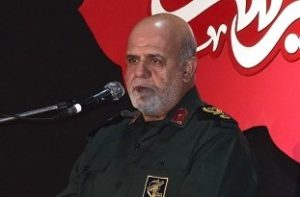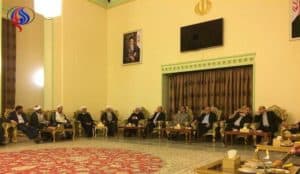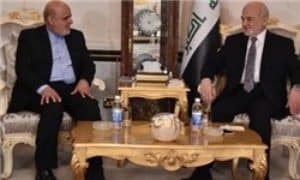 Photo 1: Qods Force commander Iraj Masjedi delivering a speech in Iran’s northern province of Mazandaran, December 2016.
Photo 1: Qods Force commander Iraj Masjedi delivering a speech in Iran’s northern province of Mazandaran, December 2016.
An Iranian general from the Islamic Revolutionary Guard Corps (IRGC) began his new position this week as Tehran’s ambassador to Iraq. The selection of Brigadier General Iraj Masjedi, the senior adviser to the commander of the IRGC extraterritorial branch the Qods Force, highlights Tehran’s strategy to assert itself as the dominant foreign power and block Washington’s influence in Iraq following the Mosul campaign.
Under the guise of Iran’s top diplomat in Iraq, Masjedi will likely coordinate key Iranian activities including support of Iranian-backed Iraqi groups, who dominate the Popular Mobilization Forces (PMF), in their quest to expand their network’s influence under the guise of helping to fill security vacuum in Iraq. Masjedi will also be involved in Tehran’s efforts to consolidate political influence via Iraqi allies in the upcoming provincial and parliamentary elections.

Photo 2: Iran’s new ambassador to Iraq, Iraj Masjedi, third from right, at Iran’s embassy in Baghdad, April 2017.

Photo 3: Iran’s envoy to Iraq Iraj Masjedi and Iraqi Foreign Minister Ibrahim al Jafari, April 2017
Opportunities and challenges ahead
Last month during a speech in Tehran, Masjedi hinted at potential paths for Tehran to increase its leverage in Iraq.
Masjedi has suggested that Iranian-assisted parallel security and intelligence groups at the provincial level could assist Iraq in combating the security threats of Sunni extremist groups. Masjedi said the Islamic State would become a “security group” following the liberation of Mosul, which is true, as affiliated militants have started to creep back into areas that they used to control, such as Salahuddin and Anbar, as covered in The Washington Post. In order to assist Iraqi security forces, Masjedi called for the formation of “popular intelligence organizations and security groups in various provinces using new equipment” provided by Iran. By “popular,” he means paramilitary groups, like IRGC-backed militias in the PMF, formed in parallel to regular Iraqi security forces. Masjedi hopes to exploit the opportunity to expand the footprint of the IRGC-backed network under the cover of helping the state address security voids.
The Qods Force general has hinted at another opportunity to expand irregular groups under the guise of addressing security issues. “Iran can prevent terrorism’s entry by creating networks that are formed in the borders of Iran and Iraq,” Masjedi said in what appeared to be a more proactive approach in combating insurgents such as the Islamic State and Kurdish separatists, all of which the regime calls “terrorists.”
Masjedi has indicated Tehran would yet again be involved in Baghdad’s upcoming elections. Iraq’s elections for provincial councils and council authorities are slated for September, followed by parliamentary elections in 2018. For more than a decade, the Qods Force has influenced key political decisions in Iraq, to extent that the selections of Iraqi prime ministers need Tehran’s sign off. Iraq’s upcoming elections are “very important,” Masjedi said. Indeed, political alliances and the balance of power have significantly changed since 2014. Masjedi reaffirmed Iran’s support for a unified Shiite National Alliance coalition, which is rife with deep fractures, as are the Sunni and Kurdish blocs. Tehran aspires to navigate through upcoming redrawing of the political landscape to shape the next Iraqi government.
Covert operations commander
Masjedi’s military background provides insight into Iran’s designs for Iraq. Born in the Arab-majority city of Abadan in southwestern Iran, Masjedi served in the Iran-Iraq War (1980-88), establishing his credentials at the Ramezan Base, a proto-Qods Force where he coordinated special operations behind enemy lines and worked with Iraqi insurgents, according to a biography by Ali Alfoneh. A number of those Iraqi insurgents have risen to key positions in the post-Saddam era. During the U.S. occupation, Masjedi was involved in Qods Force operations against US and coalition forces – operations that killed hundreds.
In recent years, Iranian press have described Masjedi as the supreme adviser to Qods Force chief Qassem Soleimani, and some reports say he is Soleimani’s adviser on Iraq, according to IRGC-affiliated Tasnim News Agency. That indicates Masjedi has significantly shaped the Qods Force’s Iraq policies.
In speeches last year, Masjedi praised the PMF as the IRGC’s “next step.”
The Qods Force’s successes and failures in Iraq
Masjedi’s selection highlights the Qods Force’s control over Tehran’s Iraq portfolio. Soleimani answers to Supreme Leader Ali Khamenei, who has the final word on all matters of Iranian foreign policy. Since 2003, all Iranian ambassadors to Iraq have been Qods Force officers. Soleimani was designated by the US Treasury as a global terrorist in 2007.
While the Qods Force has been successful in cultivating organic support in Iraq, it has faced significant failures. Soleimani brokered the 2010 re-election of the pro-Tehran, former prime minister Nouri al Maliki, whose corruption and sectarianism contributed to the state’s near full collapse and the Islamic State’s rise in 2014.
But as with so many other times in Iran’s post-revolution history, it saw opportunity in another country’s crises. Under the Qods Force’s supervision, IRGC-backed groups joined the PMF, the 60,000-to-100,000-strong umbrella organization of diverse Iraqi militias formed following the 2014 fatwa of Grand Ayatollah Ali Sistani to drive the Islamic State from the country. IRGC-backed groups are now the dominant formations in the PMF. In November 2016, the Iraqi parliament officially made the PMF a legal military bureaucracy separate from the national armed forces.
Outlook
Masjedi’s history of working with Iraqi groups and his connection to Soleimani make him a trusted appointee to help advance Tehran’s interests through upcoming opportunities and challenges in Iraq. While the success of these efforts is far from clear, he and his cohorts are determined to achieve objectives at all costs, including Iraq’s stability.
Tehran’s strength in Iraq lies in its cultivated, organic network. Any effective plan to counter that should incorporate a network-based approach to support Iraqis who seek an independent future.








1 Comment
From the above article- “But as with so many other times in Iran’s post-revolution history, it saw opportunity in another country’s crises”
How Machiavellian of Iran to actually look for opportunities in other nations crisis’s . Wow. I’m stunned.